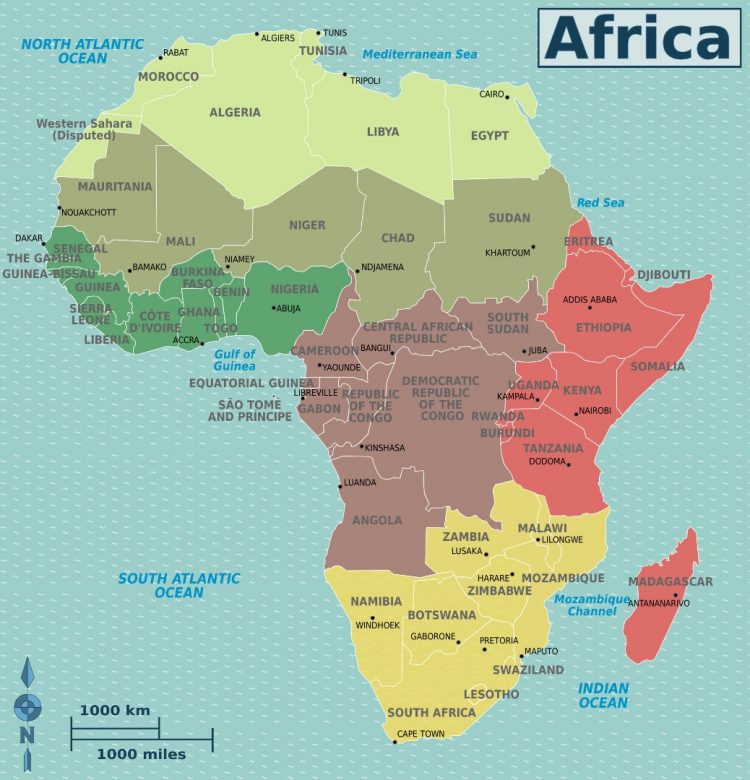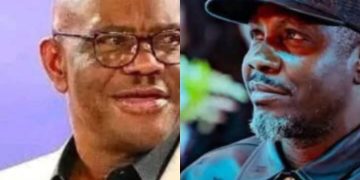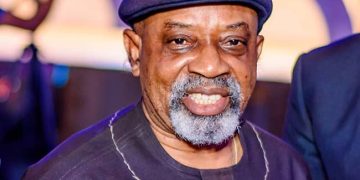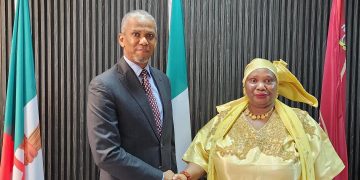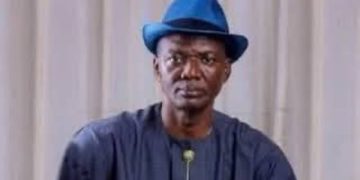Below are the seventeen African countries that gained independence in 1960
1. CAMEROON
On January 1, 1960, Cameroon declared independence from France.
Cameroon, a former German colony that was divided between France and the United Kingdom in 1918, gained independence through armed movements.
French Cameroon declared independence less than a year after the United Nations declared the end of French control.
Ahmadou Ahidjo was elected as the country’s first president on May 5, 1960.
2. NIGERIA
Nigeria was granted independence on October 1, 1960.
Divided into a federation of three regions, North, East, and West by the Lyttleton Constitution in 1954, Nigeria, with its population of 34 million, was already considered the giant of the African continent.
Balewa retained his position as Prime Minister, which he had held since 1957, while Azikiwe assumed the largely ceremonial position of Senate President.
Nigeria became a republic on October 1, 1963. Nnamdi Azikiwe was elected President of the country, although as prime minister Tafawa Balewa was still more powerful.
The former British colony was confronted with its deep ethnic and religious divisions as soon as independence was declared on October 1, which quickly became the source of severe political instability.
3. TOGO
On April 27, 1960, the Republic of Togo gained independence.
Following World War I, as a former German colony, it was placed under French and British mandates. The French administered part of the country had the status of “associated territory” in the 1946 French Union.
By referendum in 1956, the country became an autonomous republic. The victory of the Togolese Unity Committee, a nationalist movement, in legislative elections in February 1958 paved the way for independence.
Sylvanus Olympio was the republic’s first elected president. He was later assassinated during a coup in January 1963.
4. SENEGAL
Senegal gained independence from France on April 4, 1960, as part of the Mali Federation, and then became an independent nation a few months later on August 20, 1960.
In 1959, the French colony of Senegal merged with another French colony, French Sudan, to form the Mali Federation, a larger colony.
The French government signed an agreement on April 4, 1960, transferring all governmental power to the Mali Federation’s government, effectively granting the federation full independence. However, due to internal political conflicts, the federation split a few months later, with French Sudan becoming the Republic of Mali and Senegal forming the Republic of Senegal.
In September 1960, Senegal’s first president was Léopold Sédar Senghor. He was a philosopher and poet who wrote the Senegalese national anthem.
5. MALI
On June 20, 1960, the Mali Federation declared independence from France.
Senegal left the federation in August 1960, allowing the Sudanese Republic to declare independence as the Republic of Mali on September 22, 1960, which is now the country’s Independence Day.
Senegal left the federation in August 1960, and the former Sudanese Republic became the Republic of Mali, with Modibo Keta as president.
6. GABON
Gabon declared independence on August 17, 1960.
Gabon became one of the four territories of French Equatorial Africa in 1910. Gabon gained full independence from France on July 15, 1960. Gabon gained independence on August 17, 1960.
7. THE REPUBLIC OF THE CONGO
On August 15, 1960, the Republic of the Congo gained independence.
In a 1958 referendum, 99% of Congolese people voted to join the French Community, establishing the country as an autonomous republic.
Violence erupted in Brazzaville the following year, prompting a French military intervention.
Congo gained independence on August 15, 1960, with Fulbert Youlou serving as president until 1963.
8. IVORY COAST
The Ivory Coast gained independence on August 7, 1960.
A vote in 1958 resulted in the Ivory Coast becoming an autonomous republic.
In June 1960, the pro-French Félix Houphout-Boigny declared the country’s independence while keeping strong connections with Paris.
The Ivory Coast rose to become one of West Africa’s most successful countries.
9. DEMOCRATIC REPUBLIC OF THE CONGO
On June 30, 1960, Congo gained independence.
Riots erupted in Kinshasa, in what was then known as the Belgian Congo, in January 1959.
Belgian officials summoned the Congo’s top leaders to Brussels and decided to withdraw from the nation, anticipating an independence struggle similar to the one raging in Algeria at the time.
Belgian Congo, therefore, became the Democratic Republic of the Congo and was subsequently renamed Zaire during Mobutu Sese Seko’s reign.
10. MADAGASCAR
Madagascar gained independence as a democratic nation on June 26, 1960. As of 1946, it was a French overseas territory.
In 1958, this island was declared an independent state inside the French Community.
President Philibert Tsiranana persuaded General de Gaulle to grant Madagascar absolute statehood in 1960, becoming the republic’s first president.
11. MAURITANIA
On November 28, 1960, Mauritania gained independence.
Despite objections from Morocco and the Arab League, Mauritania declared independence on November 28.
The country’s 1964 constitution created a presidential administration, with Prime Minister Ould Daddah as president. He was in power until 1978.
12. BURKINA FASO
On August 5, 1960, Burkina Faso declared independence.
The Republic of Upper Volta was established as a French protectorate, although it remained a part of the French community until August 5, 1960, when it gained complete independence.
Under the administration of Thomas Sankara, who was killed in 1987, the country adopts the name Burkina Faso in 1984.
13. CHAD
Chad became independent on August 11, 1960.
Two years after becoming a republic, Chad achieved independence on August 11, 1960.
The prime minister at the time, François Tombalbaye, thus became the first president of a country that deteriorated rapidly into civil war between the Muslim north and the Christian-majority south.
14. CENTRAL AFRICAN REPUBLIC
The Central African Republic won independence on August 13, 1960.
Ubangi-Chari, which had been under French rule since 1905, became the Central African Republic on December 1, 1958.
When the country declared independence on August 13, 1960, David Dacko was driven to the throne.
Boganda, a devout pan-Africanist, reigned over French Equatorial Africa for two years, campaigning for African emancipation. He was killed in an aviation crash on March 29, 1959.
15. BENIN
On August 1, 1960, the Benin Republic gained independence.
On September 28, 1958, a vote supporting a French-African Community cleared the stage for Dahomey’s independence two years later, when power was transferred to President Hubert Maga.
The country renamed Benin in 1975, has had a tumultuous political history since independence.
16. NIGER
Niger got its independence on August 3, 1960.
A referendum in 1958 propelled Hamana Diori to power.
The republic was proclaimed on December 18, 1958, but independence was solemnly declared on August 3, 1960.
Hamani, the country’s first president, was overthrown by a coup d’état in 1974.
17. SOMALIA
Somalia got its independence on July 1, 1960.
A former Italian colony, Somalia merged on the day it became independent with the former British protectorate of Somaliland in 1960 to form the Somali Republic.
Somaliland had itself gained its full sovereignty five days earlier. The objective was to reconstitute the “Greater Somalia” of the pre-colonial era, which had included Kenya, Ethiopia, and the future Djibouti, which was at that time under French control.
Aden Abdulle Osman Daar, popularly known as Aden Adde, was a Somali politician who served as the first president of the Somali Republic from July 1, 1960, to July 6, 1967.
Source: THE NATION


